'The Russians are determined': Ukrainian soldiers defending Donbas city try to keep up morale under fire

In most of Ukraine, Russia's war effort is slowing down, its forces losing ground after they pulled out of the north and the capital, Kyiv.
But in Lysychansk, 700 kilometres east of the capital, that is all a world away. It is here that Russia is pushing its renewed offensive in Ukraine's eastern Donbas region the hardest, concentrating its forces and slowly but surely moving forward.
Almost three months into the war, only a small sliver of Luhansk oblast, one of two main administrative regions that make up Donbas, remains under Ukrainian control. Fighting here is constant, with artillery and mortar shelling coming without end.
Colossal plumes of thick black smoke rose from the Lysychansk oil refinery after it was struck repeatedly by Russian howitzers over the past week.
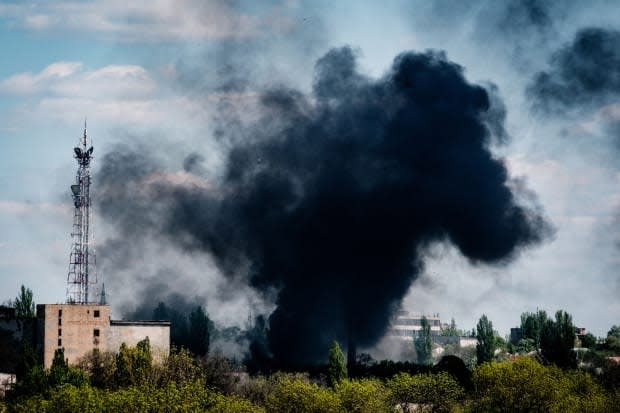
The scenes from the city itself are apocalyptic. Streets are pockmarked with shelling and nearly deserted — of the 200,000 inhabitants Lysychansk and neighbouring Severodonetsk had before the war, only about a fifth remain.
Civilians are rarely out on the street. When CBC visited Lysychansk last Thursday, a man rode past on a bicycle, lazily smoking a cigarette, not reacting to the constant shellfire that has become a feature of life here.
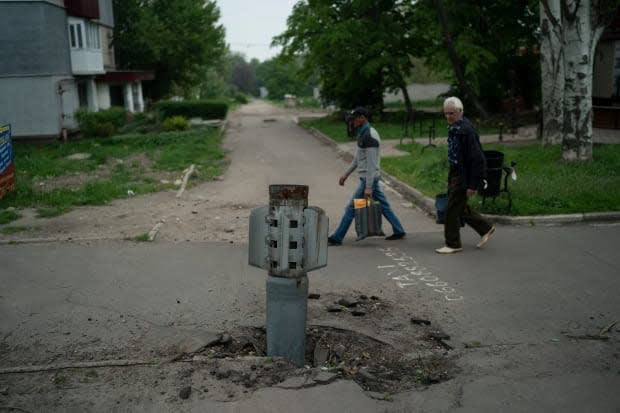
The mood among the Ukrainian fighters defending the city varies.
One commander, who identified himself by his call sign, Spartak, was in high spirits. He leads a battalion of 350 men defending the city and Severodonetsk, which sits across the Seversky Donets River from Lysychansk.
"The situation is tough," Spartak said. "Our task is to defend Luhansk, or what's left of it, but the Russians are determined."
As he spoke, another volley of artillery struck several kilometres away.
"That was probably theirs," said another soldier, Roman. "They have far more [artillery] ammunition than us. They are firing about three shells for every one we do."
Spartak, Roman and the other Ukrainian soldiers were not authorized to give their full names as active-duty service members.
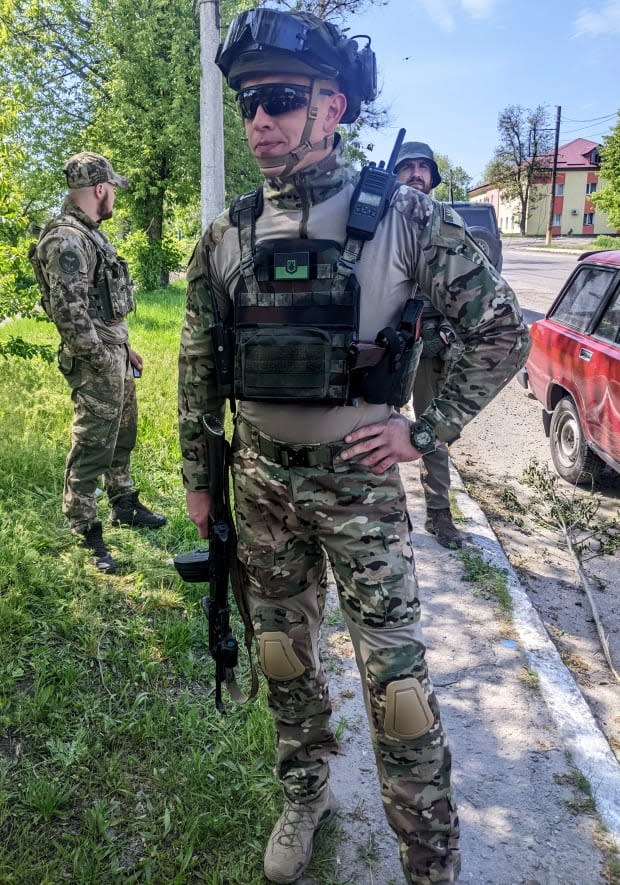
Russia bringing in more troops
Spartak says fresh troops have bolstered the Russian advance.
"They gathered reinforcements and moved units here from other fronts," he said. "In the last few days, four new brigades arrived." That would mean thousands of additional Russian soldiers in the fight.
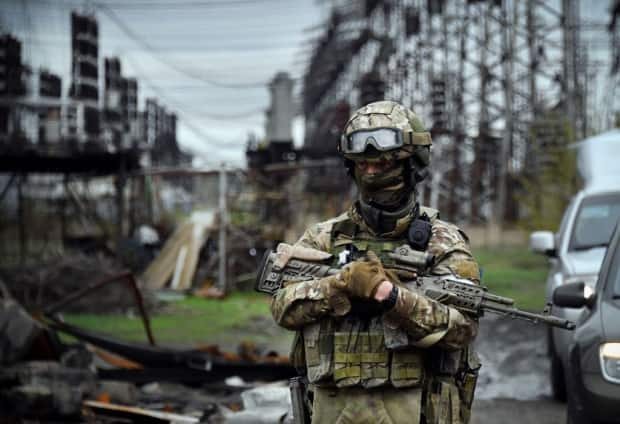
Having failed in its sweeping initial war aims, including capturing Kyiv and installing a puppet government, Moscow recalibrated its military toward a narrower goal: the capture of Donbas and the destruction of Ukrainian forces there.
On March 25, about a month after the invasion began, Russian officials announced that the first phase of their military operation was "complete" and that Russia would now focus on the Donbas region.
Over the following week, Russian forces were withdrawn from across northern Ukraine, abandoning that theatre in order to commit entirely to seizing the remainder of Donetsk and Luhansk oblasts.
This has enabled Russia to make consistent gains. Russian forces have pushed forward in several areas of Donbas, with a largely stalled offensive from the junction town of Izyum flanked by more significant advances near Lysychansk and farther south.
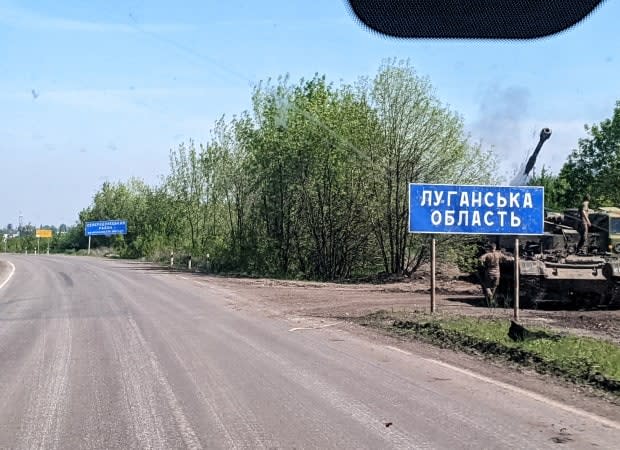
Russian forces are also close to fully taking the strategic port city of Mariupol, south of Donetsk.
Spartak is tight-lipped on the subject of losses in his own ranks. He says only that Ukrainian casualties are lower than those on the Russian side, which he says number "30 to 40 men a day, plus two to three tanks."
Civilian casualties in Lysychansk are hard to count, but Spartak said there are "thousands dead, at least."
CBC could not independently verify those numbers.

'There are also Chechens here'
He says one unit on the Russian side is suffering significantly less than others.
"There are also Chechens here," Spartak said, referring to fighters dispatched by Ramzan Kadyrov, the strongman leader of the Russian province of Chechnya and a staunch partner of President Vladimir Putin.
"They never fight. They just stand in the second or third line, make TikTok videos and beat prisoners."
Kadyrov's men are intended more for intimidation purposes, he said.
"They are blocking units," Spartak explained.
Such units are akin to the infamous "barrier troops" used by the Soviet Red Army in the Second World War to prevent retreat and execute deserters.
"Their real purpose is to 'encourage' those Russian soldiers who don't want to fight to continue forwards," he said.
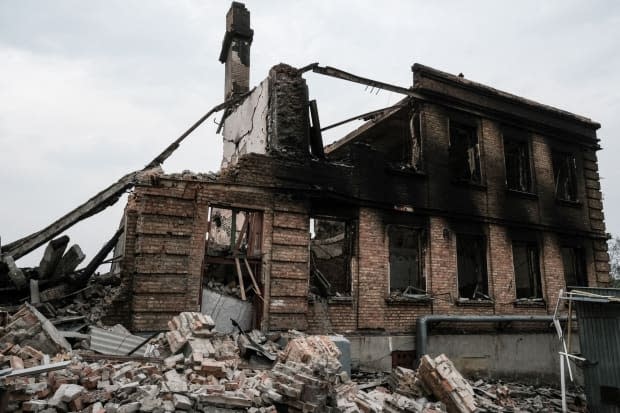
While Russian morale is evidently not particularly high, their sheer numbers and firepower are enabling them to grind forward.
On the Ukrainian side, soldiers remain committed to the defence, but the relentless assault is beginning to wear them down.
'We were forced to retreat'
Roman had just finished a hard night of fighting when CBC spoke to him last Thursday.
"Today is a very quiet day," he said, despite the persistent shelling. "The Russians are repositioning their forces for a new assault on Severodonetsk now that they've taken Rubizhne."
Roman was present for the final battles in Rubizhne, a town northwest of Lysychansk on the eastern side of the river.

"We were forced to retreat last night," he said. "We didn't have the forces to hold the town, so we blew up the bridge and pulled back to Severodonetsk."
He says Russian forces are attempting to cut off Ukrainian troops in Luhansk and form a new pocket there.
"The Russians are trying to advance now from Popasna," Roman said referring to a town 20 kilometres south of Lysychansk that was taken by Russian troops on May 8.
He said they are trying to cross the river to the southwest and connect with forces moving from the southeast.
"If the situation doesn't improve, we will be surrounded," Roman said.
WATCH | Canadian fighting in Ukraine describes Donbas battles as 'hell':
The benefits of Western weaponry
Spartak was more confident and stressed the need for additional troops.
"The enemy is getting reinforcements, and we don't have enough ammunition for our artillery, either," he said.
Some newly transferred Western weaponry has arrived in the area, bolstering Ukrainian capabilities. U.S.-made M777 howitzers are already in use in Donetsk while the 200 T-72 tanks donated by Poland have also been spotted en route to the front line.

More Ukrainian vehicles continue to stream into the city. During CBC's visit, four BMP-1 infantry fighting vehicles rumbled past, laden with fighters exchanging cries of "Glory to Ukraine!" and "Glory to the heroes!" A pair of T-64 tanks, the mainstay of Ukraine's armoured forces, also rolled down the road into Lysychansk.
There are hopes that Ukrainian advances near Kharkiv, Ukraine's second-largest city, 240 kilometres northwest of Lysychansk, will ease the pressure here. In the past week, a Ukrainian counteroffensive has captured large swathes of land around Kharkiv and pushed Russian troops nearly to their own border.
WATCH | Ukraine mililtary pushes Russian forces out of Kharkiv region:
"We can definitely notice a difference," Spartak said. "It has distracted [the Russians] somewhat, and they have had to guard their flanks."
Tears of relief
After the commanders departed, another scene unfolded, one that illustrates just how isolated Lysychansk and its remaining inhabitants have become.
A car pulled up, and a stout woman in a dishevelled blue shirt got out.
"What's the news?" said Tatiana Malorezka, a Lysychansk resident. "We have no electricity, no mobile signal, no idea what's going on."
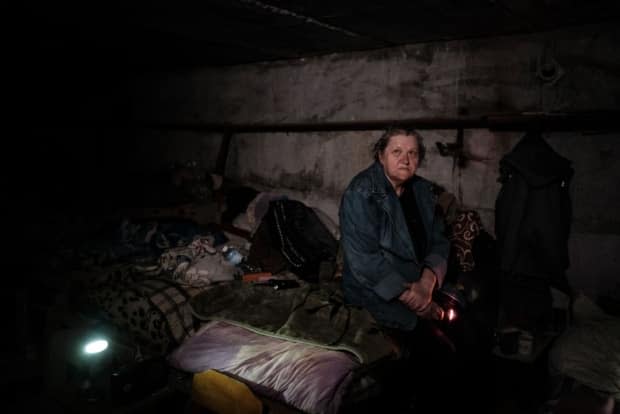
She asked the CBC crew if it was true that Russian troops had taken control of Severodonetsk, as this was what was being claimed on Russian radio broadcasts — the only source of news available to local residents. Despite being just one kilometre away, the status of the neighbouring city was a mystery to Malorezka, who broke down at the news that Severodonetsk was still in Ukrainian hands.
"Thank God," she said, shedding tears of relief. "Let there be no water here, let there be no light — just as long as the Russians aren't here. I won't live under occupation."
WATCH | Last Ukrainian fighters leave Azovstal steel plant:


